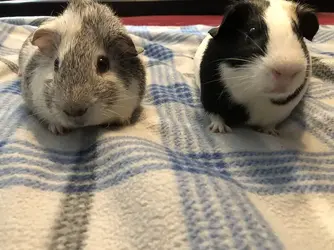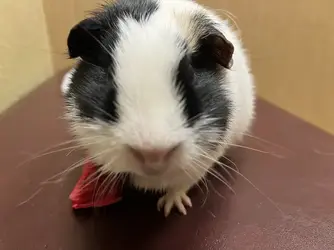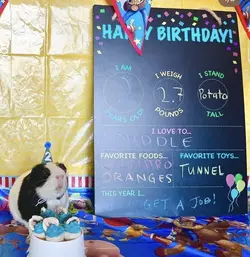Crislynf
New Born Pup
Hi everyone,
My boy Sonic underwent bladder surgery on Wednesday, July 6, to remove a stone shown in the XRAY. However, when they opened up his bladder, they only found a lot of sludge and were able to clean some, but some of the sludge went to his prostate. Thankfully, he made it through surgery and was discharged to me the next day, Thursday, July 7. Before his surgery, he was squeaking while pooping and peeing and constantly found a bit of blood in his urine. We had to wait one week before his surgery because his primary doctor was on vacation, and I don't trust other doctors with no experience with guinea pigs. After discharge, he hasn't been eating hay or drinking water; however, he goes crazy for fruits or veggies. I have been hand feeding him every 4-5 hours of Critical care or Sherwood about 15ml and providing water 1.0ml every 2-3 hours. As of right now, he is currently on Meloxicam 0.3mL (inflammation & pain) once a day, Baytril (antibiotic) 0.4mL twice a day, & Reglan 0.45mL (gut motility) twice a day. His urine output is good but still with a bit of blood. His poops are very inconsistent. I do provide probiotics 2 hours after antibiotics are given. He has a follow-up appointment on Wednesday, July 13.
Questions:
1. When will the bloody urine stop?
2. Why is he still in pain while pooping and peeing?
3. Should I ask the doctor for a bladder flush if possibly he is bleeding due to bladder sludge irritating his bladder?
4. How do I encourage him to eat his hay?
5. What are the low calcium veggies or fruits he can eat? I'm a bit confused.
Any advice/tips are welcome, thank you
My boy Sonic underwent bladder surgery on Wednesday, July 6, to remove a stone shown in the XRAY. However, when they opened up his bladder, they only found a lot of sludge and were able to clean some, but some of the sludge went to his prostate. Thankfully, he made it through surgery and was discharged to me the next day, Thursday, July 7. Before his surgery, he was squeaking while pooping and peeing and constantly found a bit of blood in his urine. We had to wait one week before his surgery because his primary doctor was on vacation, and I don't trust other doctors with no experience with guinea pigs. After discharge, he hasn't been eating hay or drinking water; however, he goes crazy for fruits or veggies. I have been hand feeding him every 4-5 hours of Critical care or Sherwood about 15ml and providing water 1.0ml every 2-3 hours. As of right now, he is currently on Meloxicam 0.3mL (inflammation & pain) once a day, Baytril (antibiotic) 0.4mL twice a day, & Reglan 0.45mL (gut motility) twice a day. His urine output is good but still with a bit of blood. His poops are very inconsistent. I do provide probiotics 2 hours after antibiotics are given. He has a follow-up appointment on Wednesday, July 13.
Questions:
1. When will the bloody urine stop?
2. Why is he still in pain while pooping and peeing?
3. Should I ask the doctor for a bladder flush if possibly he is bleeding due to bladder sludge irritating his bladder?
4. How do I encourage him to eat his hay?
5. What are the low calcium veggies or fruits he can eat? I'm a bit confused.
Any advice/tips are welcome, thank you


